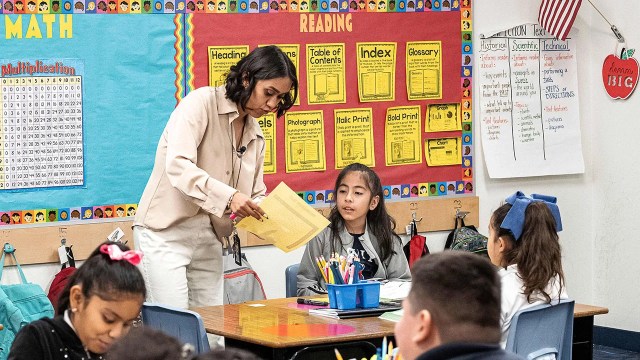Exploring the Conveniences of Preschool Programs: A Comprehensive Overview to Very Early Education And Learning
Preschool programs play a crucial role fit a kid's early educational experience. They offer a structured setting where young learners can develop essential social abilities, emotional durability, and cognitive capacities. These foundational skills are necessary as kids relocate into even more formal education. Comprehending exactly how these programs add to a kid's growth exposes much concerning their long-lasting academic trajectory. What specific benefits do these very early experiences use, and just how do they affect a youngster's future?
The Significance of Social Abilities Development
While many aspects of very early education focus on scholastic skills, the growth of social abilities in kindergarten programs is just as essential. Social skills incorporate the capacity to connect successfully, work together with peers, and browse social circumstances, every one of which are vital for a kid's overall advancement. In preschool, children learn to share, take turns, and solve conflicts, promoting a sense of neighborhood and belonging. These experiences make it possible for young learners to develop and create friendships empathy, preparing for favorable connections in the future.
Educators play a pivotal role in promoting social ability development with structured tasks and led interactions. With team tasks and play, children practice vital abilities such as paying attention, negotiating, and understanding diverse point of views. These communications help children build confidence and self-esteem, crucial components for their academic and individual trips. On the whole, nurturing social abilities in preschool improves youngsters's experiences and prepares them for the complexities of social life beyond school.

Structure Psychological Durability in Youthful Learners
Building emotional resilience in young learners is essential to their total health and success in numerous aspects of life. Kindergarten programs provide an organized atmosphere where kids can find out to navigate their emotions successfully. Via guided communications and activities, educators assist youngsters identify and reveal their sensations, cultivating a sense of self-awareness.
Moreover, these programs usually consist of techniques for dealing with obstacles, such as problem-solving activities and role-playing situations that prepare youngsters for real-life circumstances. By encouraging teamwork and empathy, young learners establish strong social connections, which are necessary for psychological support.
Educators play a pivotal function in modeling strength by demonstrating how to take care of tension and hardship. As youngsters observe these behaviors, they internalize important coping devices, outfitting them to take care of future emotional difficulties with better ease. In general, nurturing emotional durability in very early education and learning lays a solid foundation for lifelong mental health and wellness and adaptability.
Enhancing Cognitive Capacities Through Structured Learning
As kids participate in structured knowing experiences within preschool programs, their cognitive capacities are significantly boosted. These programs present age-appropriate activities that stimulate critical thinking and analytical skills. Hands-on tasks such as challenges and building blocks promote spatial awareness and sensible thinking.
Additionally, interactive narration and team conversations foster language growth, increasing vocabulary and understanding. Through structured routines, kids discover to comply with instructions, boosting their exec functioning skills, which are necessary for future scholastic success.
Social interactions within these programs this link also play a considerable function, as kids discover to team up and connect effectively, further increasing cognitive growth.
Furthermore, integrating play-based understanding permits youngsters to check out principles in an enjoyable and engaging way, strengthening their understanding and retention of knowledge. On the whole, structured learning in preschool lays a strong structure for cognitive growth, preparing children for the difficulties of greater education and learning.
Cultivating a Love for Lifelong Understanding

Additionally, positive interactions with educators and peers add to a setting where knowing is considered as satisfying and delightful. This supportive atmosphere assists impart inherent inspiration and enhances the concept that education is a continuous journey as opposed to a destination.
As kids find their toughness and passions, they are most likely to pursue knowledge beyond the classroom, laying the foundation for a lifelong dedication to learning. Ultimately, preschool programs play an important role in shaping enthusiastic students that welcome instructional possibilities throughout their lives.
Planning For Future Academic Success
While fundamental skills are critical for very early students, kindergarten programs additionally play an important role in preparing kids for future academic success. These programs introduce essential concepts such as proficiency and numeracy, ensuring that over at this website children create the cognitive capacities needed for advanced learning. By taking part in structured activities, pupils boost critical thinking and problem-solving abilities, laying a solid groundwork for their instructional journey.
Moreover, preschool promotes social-emotional growth, allowing children to browse collaborative jobs and develop relationships with peers. This collective setting imparts a feeling of belonging and increases self-confidence, which is necessary for scholastic persistence.
In addition, exposure to diverse understanding experiences in kindergarten grows adaptability, furnishing youngsters to tackle different topics and difficulties in succeeding qualities (Grade School). Inevitably, by offering a versatile very early education and learning, kindergarten programs ensure that youngsters are not just ready for very first find quality but likewise planned for continued academic accomplishment throughout their academic jobs
Frequently Asked Questions
What Age Is Suitable for Starting Preschool Programs?
The suitable age for beginning preschool programs is typically between five and six years old. This age allows children to develop vital social, emotional, and cognitive skills, preparing them for future academic success and personal growth.
Just how Do I Pick the Right Preschool Program for My Youngster?
To select the ideal preschool program, one need to take into consideration variables such as educational program, educator credentials, course dimension, place, and the school's philosophy. Observing the environment and celebration responses from various other parents can also be useful.
Are There Any Type Of State Needs for Kindergarten Enrollment?
Many states have specific demands for preschool enrollment, consisting of age limitations and paperwork such as copyright or evidence of residency (Kindergarten). Moms and dads ought to consult their local education and learning authority to comprehend the exact standards in their area
What Should Parents Anticipate During a Typical Preschool Day?
During a regular preschool day, moms and dads can expect organized activities including circle time, innovative play, basic academic lessons, treat breaks, and social communication, all developed to cultivate discovering and development in a caring environment.
Exactly How Can Parents Assistance Learning in your home along with Preschool?
Moms and dads can support finding out at home by taking part in regular analysis, including academic video games, establishing a constant regimen, encouraging interest via concerns, and developing a favorable, nurturing atmosphere that cultivates exploration and imagination.
Preschool programs play a pivotal function in forming a child's early academic experience. Preschool programs provide a structured atmosphere where youngsters can learn to browse their feelings effectively. As children engage in structured understanding experiences within preschool programs, their cognitive abilities are substantially enhanced. By engaging children in diverse activities-- such as storytelling, hands-on experiments, and collective jobs-- preschool programs grow inquisitiveness and expedition. While fundamental abilities are essential for early learners, kindergarten programs likewise play an important duty in preparing youngsters for future scholastic success.